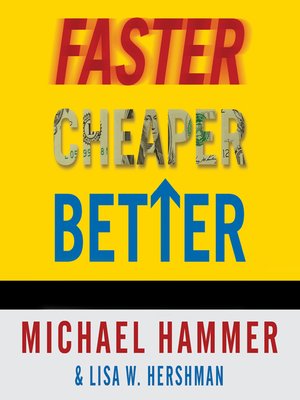Faster Cheaper Better
audiobook (Unabridged) ∣ The 9 Levers for Transforming How Work Gets Done
By Michael Hammer

Sign up to save your library
With an OverDrive account, you can save your favorite libraries for at-a-glance information about availability. Find out more about OverDrive accounts.
Find this title in Libby, the library reading app by OverDrive.



Search for a digital library with this title
Title found at these libraries:
| Library Name | Distance |
|---|---|
| Loading... |
The rough patch we have had for the past couple of years is only going to continue. Michael Hammer's brilliance was especially acute during tough times when people in business had to hunker down and just be plain better than the competition. His focus was on the nuts-and-bolts of how work actually gets done, showing people how to transform a business by improving the way it is run—whether it's a factory or a software company. While he worked with CEOs, much of his life was spent two and three levels down, with people who run refineries, develop new pharmaceuticals, make the packaging for food products, market financial services, deliver health care, or develop software. Hammer's mantra was, "My job isn't to tell people what business they should be in, that's up to them. I simply tell them how to do it best—whether it's something as complex as software or as simple as widgets, and that means doing it differently."
The central problem Hammer saw is that despite good intentions, companies don't perform at the levels they need to because the way they do things is screwed up. This book is a tool kit for how to do things right, providing its listeners with the skills to make deep and fundamental changes in how companies do their work.
Given the range of people and the types of companies Hammer worked with, Faster Cheaper Better will benefit a wide range of people. It includes those at the top as well as middle managers and business professionals. Its focus on operations and process make it the ideal book not only for those who run a factory, refinery, or the customer service operation of a bank, but also people and companies engaged in creative activities—such as book publishers, software companies, and pharmaceutical firms.
The central problem Hammer saw is that despite good intentions, companies don't perform at the levels they need to because the way they do things is screwed up. This book is a tool kit for how to do things right, providing its listeners with the skills to make deep and fundamental changes in how companies do their work.
Given the range of people and the types of companies Hammer worked with, Faster Cheaper Better will benefit a wide range of people. It includes those at the top as well as middle managers and business professionals. Its focus on operations and process make it the ideal book not only for those who run a factory, refinery, or the customer service operation of a bank, but also people and companies engaged in creative activities—such as book publishers, software companies, and pharmaceutical firms.







